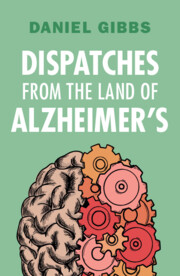Book contents
- Dispatches from the Land of Alzheimer’s
- Reviews
- Dispatches from the Land of Alzheimer’s
- Copyright page
- Dedication
- Lost in Thought
- Contents
- Acknowledgments
- Prologue
- 1 Physician Heal Thyself
- 2 Evaluating New Advances in Alzheimer’s Research
- 3 Alzheimer’s Dementia or Alzheimer’s Disease
- 4 The First Patient with Alzheimer’s Disease
- 5 Kidnapped in Kinshasa
- 6 Smell, Disgust, and Alzheimer’s
- 7 Apolipoprotein-4 (APOE-4)
- 8 Lost in the Fog of Alzheimer’s
- 9 My Father’s “Stuff”
- 10 Face Blindness during a Pandemic
- 11 Biomarkers for Alzheimer’s Disease
- 12 Olfactory Impairment in Covid-19 and Alzheimer’s
- 13 Alzheimer’s Disease and Work
- 14 Crossword Controversies
- 15 Can Loneliness Increase Risk for Dementia?
- 16 Excessive Laxative Use and Dementia
- 17 Dog Dementia (Canine Cognitive Dysfunction)
- 18 The Possible Role of Brain Inflammation in Alzheimer’s Disease May Be More Significant in APOE-4 Carriers
- 19 Surprisingly Good News about the Acetylcholinesterase Inhibitors (Donepezil, Rivastigmine, and Galantamine)
- 20 More about the Importance of Exercise
- 21 Rolling on the River
- 22 The MIND Diet Revisited
- 23 My Photographs, Then and Now
- 24 Does Cataract Surgery Really Decrease the Risk of Dementia?
- 25 Hearing Loss, Aphasia, and Dementia
- 26 To Sleep, Perchance to Dream
- 27 The Amyloid Hypothesis Is Not Dead, but It May Be Gasping for Breath
- 28 Could Lecanemab Offer a Ray of Hope?
- 29 A Fatal Case of Multiple Brain Hemorrhages Associated with Lecanemab
- 30 Cerebral Amyloid Angiopathy (CAA)
- 31 Hitting the Sweet Spot in the Spectrum of Alzheimer’s Disease for Future Trials of Anti-Amyloid Medications
- 32 Disappointing Results of Two Human Trials of Monoclonal Antibodies in Parkinson’s Disease
- 33 Repurposing Old Drugs for Alzheimer’s Treatment
- 34 Writing While Impaired
- 35 Spreading the Word
- 36 Saying Goodbye to Lizzie G
- 37 Amyloid and Tau PET Scans of My Brain
- 38 Running on a Field of Dreams
- 39 Living in the Moment with Alzheimer’s
- Index
- Plate Section (PDF Only)
- References
11 - Biomarkers for Alzheimer’s Disease
Published online by Cambridge University Press: 19 January 2024
- Dispatches from the Land of Alzheimer’s
- Reviews
- Dispatches from the Land of Alzheimer’s
- Copyright page
- Dedication
- Lost in Thought
- Contents
- Acknowledgments
- Prologue
- 1 Physician Heal Thyself
- 2 Evaluating New Advances in Alzheimer’s Research
- 3 Alzheimer’s Dementia or Alzheimer’s Disease
- 4 The First Patient with Alzheimer’s Disease
- 5 Kidnapped in Kinshasa
- 6 Smell, Disgust, and Alzheimer’s
- 7 Apolipoprotein-4 (APOE-4)
- 8 Lost in the Fog of Alzheimer’s
- 9 My Father’s “Stuff”
- 10 Face Blindness during a Pandemic
- 11 Biomarkers for Alzheimer’s Disease
- 12 Olfactory Impairment in Covid-19 and Alzheimer’s
- 13 Alzheimer’s Disease and Work
- 14 Crossword Controversies
- 15 Can Loneliness Increase Risk for Dementia?
- 16 Excessive Laxative Use and Dementia
- 17 Dog Dementia (Canine Cognitive Dysfunction)
- 18 The Possible Role of Brain Inflammation in Alzheimer’s Disease May Be More Significant in APOE-4 Carriers
- 19 Surprisingly Good News about the Acetylcholinesterase Inhibitors (Donepezil, Rivastigmine, and Galantamine)
- 20 More about the Importance of Exercise
- 21 Rolling on the River
- 22 The MIND Diet Revisited
- 23 My Photographs, Then and Now
- 24 Does Cataract Surgery Really Decrease the Risk of Dementia?
- 25 Hearing Loss, Aphasia, and Dementia
- 26 To Sleep, Perchance to Dream
- 27 The Amyloid Hypothesis Is Not Dead, but It May Be Gasping for Breath
- 28 Could Lecanemab Offer a Ray of Hope?
- 29 A Fatal Case of Multiple Brain Hemorrhages Associated with Lecanemab
- 30 Cerebral Amyloid Angiopathy (CAA)
- 31 Hitting the Sweet Spot in the Spectrum of Alzheimer’s Disease for Future Trials of Anti-Amyloid Medications
- 32 Disappointing Results of Two Human Trials of Monoclonal Antibodies in Parkinson’s Disease
- 33 Repurposing Old Drugs for Alzheimer’s Treatment
- 34 Writing While Impaired
- 35 Spreading the Word
- 36 Saying Goodbye to Lizzie G
- 37 Amyloid and Tau PET Scans of My Brain
- 38 Running on a Field of Dreams
- 39 Living in the Moment with Alzheimer’s
- Index
- Plate Section (PDF Only)
- References
Summary
Brain imaging tests such as CT and MRI scans can be helpful biomarkers for frontotemporal dementia because of the typical atrophy of the frontal and temporal lobes sparing more posterior parts of the brain. For other types of dementia, these imaging tests are not as helpful, although they may be important to rule out tumors, strokes, and hydrocephalus (excess fluid in the brain). Over the last ten years or so, PET scans that can image beta-amyloid plaques and tau-containing tangles have been developed and are now clinically available. These scans can be very useful in confirming a diagnosis of Alzheimer’s and staging the severity of the disease in research settings. However, they are very expensive and often not covered by insurance, presenting barriers for clinical use outside of research.
Keywords
Information
- Type
- Chapter
- Information
- Dispatches from the Land of Alzheimer's , pp. 49 - 51Publisher: Cambridge University PressPrint publication year: 2024
